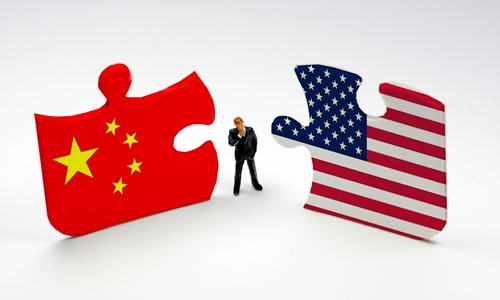HOME >> SOURCE
China, US carry out phase one deal despite complications
By Wang Cong and Li Qiaoyi Source:Global Times Published: 2020/2/14 22:57:57
Uncertainty, risks remain for implementation, phase two talks

Photo: VCG
China and the US on Friday moved to implement the phase one trade agreement, as both sides cut by half some tariffs on tens of thousands of each other's products for the first time since Washington initiated the tit-for-tat tariff war nearly two years ago, despite rising complications including the outbreak of the deadly coronavirus in China.
However, in spite of China's commitment to the phase one deal and further negotiations, the novel coronavirus epidemic and US officials' intensifying crackdown on Chinese telecom giant Huawei could cast some uncertainty going forward, Chinese trade experts noted.
As previously pledged under the phase one trade agreement signed last month, the US on Friday cut a 15 percent tariff on $120 billion worth of Chinese products to 7.5 percent. In return, China also on Friday reduced tariffs of 10 percent and 5 percent on US goods worth $75 billion by half.
While the move had been anticipated and tariffs remain on both sides, it marked the first time the US had rolled back unilateral, punitive tariffs for about two years. The phase one agreement, which also includes a pledge by China to increase purchases of US goods by $200 billion over the next two years, has also been widely cheered by businesses around the world as it brought some certainty amid the trade war.
However, as China continues to combat the outbreak of the coronavirus, which has brought the world's second-largest economy to a near standstill, there have been rising concerns over the implementation of the phase one agreement and negotiations for a phase two deal.
"[The epidemic] will be too big a problem for the agreement to go into effect and be implemented," Gao Lingyun, an expert at the Chinese Academy of Social Sciences in Beijing, told the Global Times on Friday.
Although the epidemic might have "a little" impact on imports from the US, it will not affect the figure both sides have agreed, Gao said. "It will only be a delay rather than a cancellation."
Craig Allen, president of the US-China Business Council, which represents US companies that work with China, also said that the epidemic will not halt China's purchases of US goods and services, according to Reuters.
In the wake of the epidemic, some in the US have raised questions over China's willingness as well as ability to fulfill its commitments. Many in China have also suggested the use of a disaster-related clause in the phase one deal to start consultations with the US over the purchases.
That is likely to be discussed when the two sides conduct periodical reviews of the trade agreement, said Tu Xinquan, dean of the China Institute for WTO Studies at the University of International Business and Economics in Beijing. "The epidemic will definitely impact the agreement," he told the Global Times on Friday.
The epidemic could also push back negotiations for a phase two agreement not just because of the epidemic but also because of Washington's new attempt to further crack down on Huawei, which appears to be held as leverage by US officials in trade talks, Gao said.
"In negotiations, China has stressed that the US must create [favorable] conditions for China to expand imports and that the US cannot ask China to increase imports while at the same time cracking down on Huawei. This won't work," Gao said.
The US Justice Department on Thursday issued new charges against Huawei, accusing the Chinese company of stealing US trade secrets and violating US sanctions against Iran.
China's Foreign Ministry on Friday criticized the US move as "immoral and dirty" and urged the US to stop its "baseless" crackdown on Chinese firms.
Newspaper headline: China, US move to carry out phase one deal despite complications
Posted in: ECONOMY